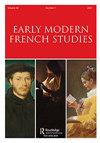Bérénice受审:审判Cornelle对抗Racine
IF 0.2
3区 历史学
Q2 HISTORY
引用次数: 0
摘要
1670年11月21日,巴黎的观众们可以在Hôtel de Bourgogne剧院观看拉辛的《bacry - bacry - sise》,一周后,在皇家宫殿观看高奈依的《Tite et bacry - sise》的首演,因为剧作家们和他们的剧团都在争夺票房的成功。尽管拉辛取得了胜利,但关于剧作家的学术研究将这场决斗的重要性降到最低,认为它只是众多喜剧斗争中的一次。本文认为,1673年匿名出版的喜剧《蒂特和提图斯,你的批评》使我们能够更好地理解决斗戏剧是如何成为两位剧作家的决定性经历的。这部喜剧上演了拉辛饰演的提图斯和高乃依饰演的提特,他们来到阿波罗神面前接受审判,互相指责对方冒充神。通过理解帕纳斯审判的寓言,我们可以看到巴姆萨姆斯决斗的风险,并说明17世纪最后25年法国对悲剧类型接受程度的变化。本文章由计算机程序翻译,如有差异,请以英文原文为准。
Bérénice on Trial: Judging Corneille Against Racine
On 21 November 1670, Parisian spectators could watch Racine's Bérénice at the Hôtel de Bourgogne and, a week later, attend the premiere of Corneille's Tite et Bérénice at the Palais Royal, as the playwrights and their troupes vied for box office success. Despite Racine's victory, scholarship on the playwrights has minimized the importance of this duel as just one among many guerres comiques. This essay argues that the comedy, Tite et Titus ou Critique sur les Bérénices, published anonymously in 1673, enables a better understanding of how the duelling plays were a defining experience for both playwrights. The comedy stages Racine's Titus and Corneille's Tite, who come before the god Apollon in judgment, accusing one another of impersonation. Understanding the allegory of the Parnasse trial renders visible the stakes of the Bérénice duel and illustrates the changing reception of the tragic genre in the last quarter of seventeenth-century France.
求助全文
通过发布文献求助,成功后即可免费获取论文全文。
去求助
来源期刊

Early Modern French Studies
Multiple-
CiteScore
0.10
自引率
0.00%
发文量
14
期刊介绍:
Early Modern French Studies (formerly Seventeenth-Century French Studies) publishes high-quality, peer-reviewed, original articles in English and French on a broad range of literary, cultural, methodological, and theoretical topics relating to the study of early modern France. The journal has expanded its historical scope and now covers work on the sixteenth, seventeenth, and eighteenth centuries. Within this period of French literary and cultural history, the journal particularly welcomes work that relates to the term ''early modern'', as well as work that interrogates it. It continues to publish special issues devoted to particular topics (such as the highly successful 2014 special issue on the cultural history of fans) as well as individual submissions.
 求助内容:
求助内容: 应助结果提醒方式:
应助结果提醒方式:


